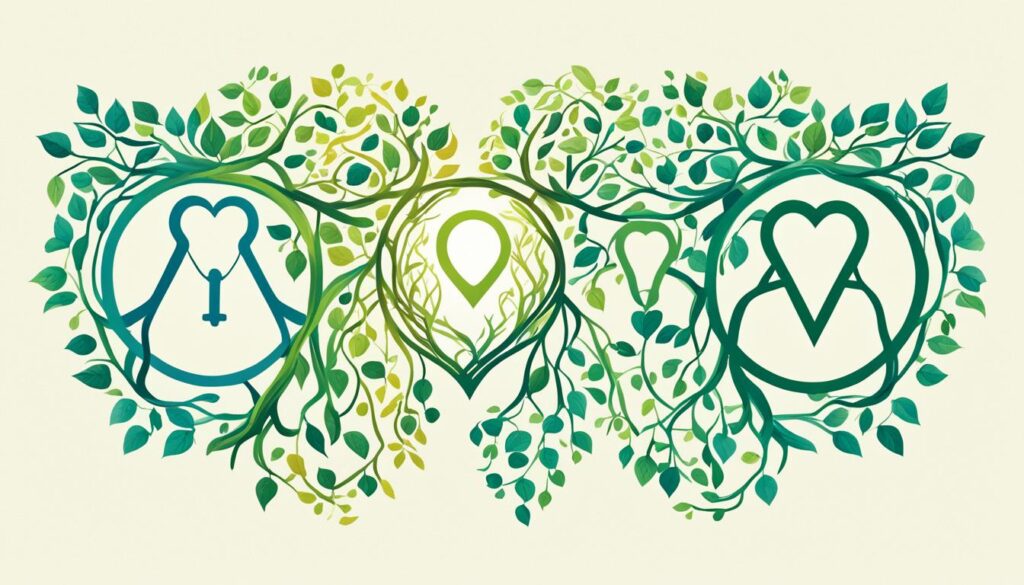Looking for the key to long, happy love? This piece dives into the complex world of relationships. It reveals how to build strong, meaningful bonds. Every relationship helps shape who we are. They give us a sense of belonging and satisfaction. From simple friendships to deep loves, connecting well needs kindness and talking things through. It also involves working as a team to handle fights and differences.
This article will look at how relationships work. It’ll show you their big effect on our lives. And it will highlight what you need for strong connections. Come on a trip of self-learning with us. We’ll share the secrets to making love, trust, and joy in our best relationships.12
Key Takeaways
- Healthy relationships can significantly improve our overall well-being and longevity.
- Effective communication is the cornerstone of a strong and fulfilling relationship.
- Building trust and intimacy are fundamental for creating a lasting bond.
- Navigating relationship challenges with empathy and conflict resolution skills can strengthen connections.
- Prioritizing self-care and establishing boundaries are essential for maintaining emotional well-being.
The Essence of Relationships
Human connections are at the core of our experience, influencing how we see the world. They define our relationship dynamics and impact our social bonds and emotional development.3
Every relationship is unique, shaped by how we talk, who we are, what we share, and what’s happening in the world around us.3 Over time, they change, facing ups and downs that show the beauty and challenge of connecting with others.
Understanding Relationship Dynamics
Relationships start by feeling close to someone and interacting with them.4 You can strengthen these ties by being aware, intentional, willing, peaceful, and open to each other.4
Deep connections can be made, even from afar, like the bond felt in online gatherings.4 Doing new things together helps in building these strong relationships and growing together.
The Profound Impact of Relationships
The relationships we build shape us emotionally and affect how we relate to others over time.5 Spending time with our close ones is key to keeping these relationships strong, as many believe.5
Listening and having heart-to-heart talks are crucial. They make us feel truly cared for, according to most studies.5 Good social ties lead to better happiness, toughness, and longer life spans. But being alone or feeling cut off can deeply harm our mental and physical health.
Building Healthy Connections
To have strong connections, we must work at them.6 Good communication is key.7 Listening well, showing you care, and talking openly help us understand and feel close to one another.7 It’s also crucial to respect each other.6 This builds trust and shows we value our loved ones.7 Being there emotionally and really hearing someone out can make our relationships deeper.7
Effective Communication
Good communication means we listen, care, and talk honestly.6 Through these actions, we build strong connections.7 It might be hard if two people communicate differently.7 But with time and effort, they can find common ground.
Mutual Respect
To trust and appreciate each other, mutual respect is crucial.6 Respecting needs, boundaries, and what makes us unique is a must.7 Honesty and fairness are also vital.7 They define a healthy relationship.
Emotional Support
Supporting each other emotionally makes our connection stronger.6 Being there, understanding, and not judging creates a safe space.7 This kind of support is good for our minds and bodies alike.7
Shared Values and Goals
Having similar beliefs and dreams unites partners.6 It gives them a goal to work towards together.7 This shared purpose makes the relationship stronger and better at facing challenges.
Boundaries and Self-Care
Setting personal boundaries and looking after ourselves keeps relationships healthy.6 We need to balance time together with our own activities and well-being.7 Knowing the difference between fairness and equality is key in long relationships.7 By taking care of ourselves, we can offer our best to our partners.7
| Characteristic | Description |
|---|---|
| Pace | Healthy relationships grow at a comfortable speed for both people.7 |
| Trust | Trust is essential, based on being there for each other and staying true.7 |
| Honesty | Telling the truth and talking openly help relationships grow.7 |
| Respect | It’s critical to value each other’s needs and limits for a strong bond.67 |
| Kindness | Being kind and understanding strengthens our connection and creates a caring environment.7 |
| Equity | Equal partnership means sharing decisions and power equally.7 |
Navigating Relationship Challenges
Despite our best efforts, relationships face challenges and conflicts. These can occur due to differences in opinions, expectations, and values.8 Handling these challenges with understanding and empathy can make relationships stronger.
Open Communication
It’s important to approach conflicts with honesty and empathy.9 Being open and honest with your partner helps solve relationship issues.8
Conflict Resolution Skills
It’s valuable to practice good conflict resolution skills. This includes active listening and finding solutions that work for both sides.910
Empathy and Understanding
Understanding the feelings and needs behind conflicts can heal and repair relationships.8
Forgiveness and Letting Go
Forgiveness and moving past grudges is crucial for healthy relationships.8
Seeking Support
When facing tough relationship problems, seeking advice from those we trust is wise.8
Using open communication and empathy, along with forgiveness and seeking support, can help face relationship problems.8910
The Complexities of Attachment Styles

The bonds formed between kids and their caregivers greatly affect their emotional development. These connections also influence their social relationships as they grow.11 It’s essential to know about attachment styles like secure, anxious, and others. These styles impact how we connect and form relationships.11 Figuring out your own style can help you understand your behaviors in relationships. This self-awareness can lead to better relationships and personal growth.
Attachment theory says having a secure attachment style is key for good relationships.12 If you’re anxious or avoidant in relationships, it might be tied to your childhood.12 But, through therapy, it’s possible to change for the better. This means you can become more secure in how you connect with others.12
| Attachment Style | Description |
|---|---|
| Secure | Individuals with a secure attachment style are comfortable with intimacy, trust their partners, and are able to effectively communicate their needs. |
| Anxious | Those with an anxious attachment style often crave closeness, fear abandonment, and may become clingy or possessive in relationships. |
| Dismissive Avoidant | Dismissive avoidant individuals tend to be independent, emotionally distant, and uncomfortable with intimacy. |
| Fearful Avoidant | Fearful avoidant individuals desire close relationships but also fear them, often leading to a pattern of push-and-pull in their connections. |
Knowing your attachment style is a great first step. It helps build better social relationships and personal growth.11 By becoming self-aware and open to change, you can improve how you relate to others. This can bring more fulfilling connections into your life.
The Love Languages Enigma
More than just how we attach, love languages shape how we give and get love. Gary Chapman’s love languages theory says we share and feel love differently. This can be through kind words, helping actions, meaningful gifts, close time together, or physical contact.
This idea has become very popular, with Dr. Chapman’s book selling over13 copies and being translated into13 languages. Although not scientifically proven, the theory helps us see how everyone shows and understands love.
Self-Awareness: The Key to Meaningful Connections
Understanding our own complexities and those of others is crucial. It helps in forming strong bonds. Knowing ourselves, recognizing our traits and what we like, is a good start for successful relationships.
Embracing Complexity
Chapman’s book on love languages is widely loved. It’s been read by so many around the world. Even though it’s not scientifically proven, it is very useful in seeing how to understand love.
Cultivating Self-Awareness
Discovering our and our partner’s love languages is key. This way, we can talk and show love in ways that really connect. Dr. Chapman’s quiz with13 questions helps us learn about these languages, improving our self-knowledge.
Seeking Common Ground
Understanding each other’s love languages helps in building stronger relationships. Many have found success with these concepts. It shows the real value of meeting each other’s emotional needs.
By working on knowing ourselves, understanding how love languages work, and finding ways to connect, we can solve the mystery.1314
Relationship Dynamics in the Modern Era

In today’s world, relationships are not easy. There are many challenges like using technology all the time and our busy jobs. Even though technology helps us talk more, it also brings new problems and things that can distract us.9 It’s important to set boundaries and spend quality, screen-free time together. This helps keep relationships strong.9
The Role of Technology
Technology is everywhere now, and it changes how we relate to each other. It’s great for keeping in touch, but it can also get in the way. Finding the right mix of digital and face-to-face time is key. This way, tech doesn’t harm our closeness.9 Creating clear rules and having times without screens can make us feel closer and more present with our partner.
Work-Life Balance
Our jobs can stress our relationships too. Sometimes, we focus so much on work that we forget to spend time with our partner.9 Making an effort to be together and keep the love alive is crucial, even when work gets tough.9 A good work-life balance ensures our relationship stays strong. It also helps us both support and enjoy each other.
To make modern love work, we need to be mindful. This means juggling technology, work, and our love life carefully. Setting rules, focusing on each other, and nurturing our bond helps create a strong, lasting love.9
Building Trust and Intimacy
Trust and intimacy are key in a strong, healthy relationship. To build trust, be consistent, reliable, and honest. Keep promises and speak the truth to create a feeling of safety.15 Breaking trust can come from hurtful actions, leading to doubt. This doubt can cause one partner to be overly controlling, which isn’t good for a relationship.15
Consistency and Reliability
It’s vital to be consistent and reliable for trust to grow. Keep your word and show up for each other. This builds a foundation of safety that every relationship needs to thrive.15 When trust is lacking, it brings negativity and doubt. This can lead to arguments, feelings of insecurity, and anxiety.15
Honesty and Vulnerability
Openness and sharing are also critical. Talk about your feelings and experiences, even when it’s hard. This makes you closer and more understanding of each other.15 Without trust, intimacy decreases and couples grow apart. To rebuild, be honest, clear, and work on your relationship together patiently.15
Nurturing Emotional and Physical Intimacy
Building emotional and physical closeness is central to any relationship. Talk deeply, share your life, and show affection. Doing these things regularly nurtures your bond.15 Where trust is shaky, it brings fear and isolation. Making intimacy a priority helps strengthen your connection and makes you both emotionally healthier.
By focusing on trust, keeping promises, and being truthful, couples lay the groundwork for a happy life together. When things get tough, couples therapy can help. It’s a way to work on trust and strengthen your bond.15
Conflict Resolution in Relationships
Disagreements happen in all relationships, but dealing with them positively can make the bond stronger.16 Stress can come from wanting different things, but working through these can avoid damage (Overall & McNulty, 2017).16 So, solving conflicts is key to keeping a relationship healthy (Grieger, 2015).
Active Listening
Listening actively means putting your own thoughts aside to really get the other’s point of view.17 Focusing on one issue at a time helps partners find answers better.17 It includes paying attention, making eye contact, and speaking from your perspective.
Using “I” Statements
17 Saying “I feel” instead of pointing fingers helps a lot. It makes people less on the defensive and more willing to talk and solve problems.
Finding Mutually Beneficial Solutions
16 When we disagree, there are four paths: one wins, the other loses, both lose, or both win (Grieger, 2015).16 The best result is both winning (Grieger, 2015).16 Looking for solutions that make both happy is the goal for couples in a healthy relationship.
16 There are four steps to solve relationship conflicts. First, get rid of distractions. Next, focus on finding a solution where both win. Then, listen on purpose. Finally, brainstorm together towards a solution (Grieger, 2015).16 Letting conflicts linger is bad for any relationship (Grieger, 2015).16 How you start and end discussions can shape your communication habits (Tatkin, 2012).16 Knowing each other’s needs is key to success (Caddell, 2013).16 Avoiding conflict altogether is not a good idea (Tatkin, 2012).16 Looking back on what you love about each other can lower tension (Williams, 2012).16 Good talking is crucial for fewer conflicts (Hannah, Luquet, Hendrix, Hunt, & Mason, 2005).
17 Staying open-minded helps a lot in finding peace after a fight.
Conclusion: Fostering Love and Happiness in Healthy Relationships
Relationships teach us about love and the depths of our hearts. They show us resilience. By showing empathy and mutual respect, we build healthy relationships. These relationships make our lives better and improve our well-being.18 Being with friends makes us happiest, then family, and being alone is the least happy.18 Being cooperative and working well with others makes us more happy.18
To have good relationships, we need to be patient and understand others. But the connection we gain is worth it. By valuing and growing these important connections, we find love and happiness. They make our lives richer.18 Having just one close relationship and several others helps fight loneliness. Plus, using good communication boosts our well-being.18
By showing empathy and honesty, we build the needed trust and intimacy. This is crucial for lasting, healthy relationships that bring deep happiness and growth.18 Sharing our thoughts and feelings positively affects the brain. It triggers positive feelings and happiness. Holding back personal feelings could lead to loneliness.18
FAQ
What are the key elements of building healthy relationships?
For a strong relationship, you need good communication and respect. You also need to support each other emotionally. Plus, having the same goals and values matters a lot. And don’t forget, healthy boundaries and self-care are crucial too.
How can couples navigate relationship challenges and conflicts?
It’s key to talk openly and address conflicts calmly. Showing understanding and being able to forgive are important too. Sometimes seeking outside help is necessary to get through tough times.
What are attachment styles, and how do they impact relationships?
Attachment styles, like secure or anxious, start in childhood. They affect how we bond with others in our lives. It’s important to understand your style and your partner’s to work on your relationship better.
How do love languages affect relationship dynamics?
Love languages show how we express and feel loved. They include things like words of affirmation or quality time. Knowing your partner’s love language can deepen your connection.
How do relationships navigate the challenges of modern technology and work-life balance?
It’s vital to have time without screens and focus on each other. Also, finding a balance between work and your personal life is key. These steps are essential for a healthy relationship nowadays.
What are the foundations of trust and intimacy in a relationship?
Trust comes from being honest and reliable every day. To be closer, both emotional and physical intimacy are crucial. Sharing deep talks, experiences, and showing physical affection are all important.
What are effective strategies for resolving conflicts in relationships?
Listening actively and expressing how you feel with “I” statements can resolve many issues. Working together to find solutions that help both of you is a good approach.
Source Links
- https://medium.com/@asifquddos2/navigating-the-complexities-of-modern-relationships-expert-advice-for-a-strong-and-healthy-a18d4b31d013
- https://medium.com/@timileyinoluwatobi1995/navigating-the-complexities-of-relationships-a-journey-of-connection-and-growth-f10c19caa08a
- https://www.linkedin.com/pulse/rediscovering-essence-relationships-beyond-love-paresh-nanda–666gc
- https://philandmaude.com/why-the-essence-of-connection-in-your-relationships-is-being-present/
- https://www.jerryacuff.com/time-is-essence-in-relationships/
- https://www.mentalhealth.org.uk/our-work/public-engagement/healthy-relationships/top-tips-building-and-maintaining-healthy-relationships
- https://jedfoundation.org/resource/how-to-create-and-maintain-healthy-relationships/
- https://www.verywellmind.com/how-to-navigate-a-complicated-relationship-5207438
- https://thriveworks.com/help-with/relationships/relationship-dynamics/
- https://www.eternityrose.com/blog/Navigating-the-Storm-Overcoming-Relationship-Challenges/
- https://goodthingsaregonnacome.com/beyond-attachment-theory-navigating-the-complexities-of-relationships/
- https://www.gottman.com/blog/attachment-style-influences-success-relationship/
- https://lifesupportscounselling.com.au/resources/blogs/use-the-five-love-languages-to-enhance-your-relationship/
- https://sunwayechomedia.com/2018/02/28/the-5-love-languages/
- https://www.verywellmind.com/how-to-build-trust-in-a-relationship-5207611
- https://positivepsychology.com/conflict-resolution-relationships/
- https://www.nu.edu/blog/seven-conflict-resolution-tips-for-couples/
- https://www.pursuit-of-happiness.org/science-of-happiness/relationships-and-happiness/

